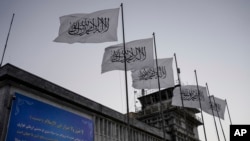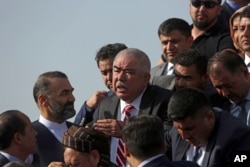Refusing to recognize the Taliban as legitimate rulers of Afghanistan and maintaining sanctions on the group's leaders, the United States continues to reject calls by some former Afghan allies to help topple the extremist regime.
Last week, Abdul Rashid Dostum, the former vice president of Afghanistan who backed U.S. Special Forces in ousting the Taliban in 2001, claimed he would be able to amass enough forces to overthrow the Taliban again, if only the United States supported him.
At least two other former Afghan generals — Sami Sadat and Khoshal Sadat — have spent several months in the U.S. seeking support from veterans, lawmakers and other groups for a potential war against the Taliban.
But the U.S. government response has been unequivocal.
"The United States does not want to see a return to violence in Afghanistan, and we do not support armed opposition to the Taliban," said a spokesperson for the U.S. Department of State, who spoke on background.
The denial of support comes with a piece of advice to Afghan groups that want to defeat the Taliban militarily.
"We call on all sides to exercise restraint and to engage. This is the only way that Afghanistan can confront its many challenges," the spokesperson told VOA.
U.S. officials say they are aware of former Afghan officials visiting the United States and advocating for armed resistance to the Taliban, but they cannot stop them because the U.S. Constitution guarantees freedom of expression for everyone inside the country.
The U.S. withdrawal from Afghanistan in August 2021 left no military support for former allies in the country and disappointed those that oppose the Taliban.
"We feel betrayed. We feel left alone. … We are empty-handed," Ahmad Massoud, leader of an anti-Taliban group, told an Aspen Security Forum last week from an undisclosed location via a video call.
Since seizing power two years ago, the Taliban have controlled all of Afghanistan's 34 provinces largely uncontested, except for periodic attacks by Islamic State-Khorasan Province.
The Taliban and IS Khorasan each have declared religious war against each other.
The U.S. government has designated leaders of the Taliban and IS-Khorasan as terrorists. However, the Taliban have made counterterrorism commitments to the U.S. under the 2020 Doha Agreement.
"The Taliban have shown themselves to be an active, and at times, effective actor against the Islamic State," said Jonathan Schroden, director of the Countering Threats and Challenges Program at the Center for Naval Analyses, a nonprofit military research group.
However, the Taliban have taken no serious actions against other groups such as al-Qaida and Tehreek-e-Taliban Pakistan, which "is troubling to the U.S. and its Western allies, as well as to China, Russia and other regional countries," Schroden said.
Last week, an IS-Khorasan propaganda wing reportedly issued pamphlets calling on anti-Taliban groups to join arms in their war against the Taliban.
Nearly all Afghan anti-Taliban leaders reside outside of Afghanistan, making it practically impossible for them to openly align with IS-Khorasan, a globally condemned terrorist group.
The U.S. policy of not supporting anti-Taliban factions is premised on the notion that giving such aid would escalate the conflict and allow for the expansion of terrorist actors, Schroden said.
Taliban engagement
After suspending direct engagement with the Taliban for months, U.S. diplomats resumed face-to-face talks with Taliban officials in Doha, Qatar, this week. The talks revolved around some of the most contentious issues, including the Taliban's ban on women's work and education, which has drawn universal condemnation.
Both sides have reported progress and a desire to continue the engagement policy.
"The Taliban will not go away by ignoring them," said Obaidullah Baheer, an Afghan analyst and adjunct lecturer at The New School in New York.
Baheer said U.S. engagement with the Taliban should not solely depend on contentious human rights conditions but include expectations for the establishment of a new constitutional order in Afghanistan and curbing the god-like powers of the Taliban's unseen supreme leader, Hibatullah Akhundzada.
For the U.S., a primary objective in engaging the Taliban has been counterterrorism.
During the two-day meetings in Doha, "U.S. officials took note of the Taliban's continuing commitment to not allow the territory of Afghanistan to be used by anyone to threaten the United States and its allies, and the two sides discussed Taliban efforts to fulfill security commitments," according to a statement from the U.S. State Department.
Speaking at an online forum on Tuesday, Mohammad Mohaqiq, an ethnic Hazara warlord and a former Afghan minister, said the many anti-Taliban factions also lack support from Afghanistan's neighboring countries for a number of reasons, including fears of an expanded armed conflict in the region.
"We must wait," Mohaqiq said.






